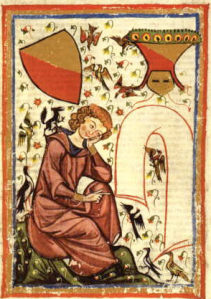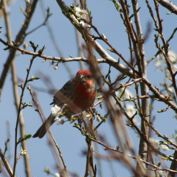When I see the lark beat his wings
for joy against the sun’s ray,
until he forgets to fly and plummets down,
for the sheer delight which goes to his heart,
alas, great envy comes to me
of those whom I see filled with happiness,
and I marvel that my heart
does not instantly melt from desire.
Alas, I thought I knew so much about love,
and really I know so little,
for I cannot keep myself from loving her
from whom I shall have no favor.
She has stolen from me my heart, myself,
herself, and all the world.
When she took herself from me, she left me nothing
but desire and a longing heart.
Never have I been in control of myself
or even belonged to myself from the hour
that she let me gaze into her eyes-
that mirror that pleases me so greatly.
Mirror, since I saw myself reflected in you,
deep sighs have been killing me.
I have lost myself, just as
handsome Narcissus lost himself in the fountain.
I despair of women,
no more will I trust them,
and just as I used to defend them,
now I shall denounce them.
Since I see that none aids me
against her who destroys and confounds me,
I fear and distrust them all
for I know well they are all alike.
In this my lady certainly shows herself
to be a woman, and for it I reproach her,
for she wants not that which one ought to want,
and what is forbidden, she does.
I have fallen out of favor
and have behaved like the fool on the bridge;
and I don’t know why it happened
except because I tried to climb too high.
Mercy is lost, in truth,
though I never received it,
for she who should possess it most
has none, so where shall I seek it?
Ah, one who sees her would scarcely guess
that she just leaves this passionate wretch
(who will have no good without her)
to die, and gives no aid.
Since with my lady neither prayers nor mercy
nor my rights avail me,
and since she is not pleased
that I love her, I will never speak of it to her again.
Thus I part from her, and leave;
she has killed me, and by death I respond,
since she does not retain me, I depart,
wretched, into exile, I don’t know where.
Tristan, you will have nothing from me,
for I depart, wretched, I don’t know where.
I quit and leave off singing
and withdraw from joy and love.
Can vei la lauzeta mover
de joi sas alas contra.l rai,
que s’oblid’ e.s laissa chazer
per la doussor c’al cor li vai,
ai! tan grans enveya m’en ve
de cui qu’eu veya jauzion,
meravilhas ai, car desse
lo cor de desirer no.m fon.
Ai las! tan cuidava saber
d’amor, e tan petit en sai,
car eu d’amar no.m posc tener
celeis don ja pro non aurai.
Tout m’a mo cor, e tout m’a me,
e se mezeis e tot lo mon;
e can se.m tolc, no.m laisset re
mas dezirer e cor volon.
Anc non agui de me poder
ni no fui meus de l’or’ en sai
que.m laisset en sos olhs vezer
en un miralh que mout me plai.
Miralhs, pus me mirei en te,
m’an mort li sospir de preon,
c’aissi.m perdei com perdet se
lo bels Narcisus en la fon.
De las domnas me desesper
ja mais en lor no.m fiarai;
c’aissi com las solh chaptener,
enaissi las deschaptenrai.
Pois vei c’una pro no m’en te
vas leis que.m destrui e.m cofon
totas las dopt’e las mescre,
car be sai c’atretals se son.
D’aisso’s fa be femna parer
ma domna, per qu’e.lh o retrai,
car no vol so c’om deu voler,
e so c’om li deveda, fai.
Chazutz sui en mala merce,
et ai be fai co.l fols en pon;
e no sai per que m’esdeve,
mas car trop puyei contra mon.
Pus ab midons no.m pot valer
precs ni merces ni.l dreiz qu’eu ai,
ni a leis no ven a plazer
qu’eu l’am, ja mais no.lh o dirai,
Aissi.m part de leis e.m recre;
mort m’a, e per mort li respon,
e vau m’en, pus ilh no.m rete,
chaitius, en issilh, no sai on.
The forty-five or so surviving poems of the most famous of the troubadours, Bernart de Ventadorn, were written in a language known as Oc or Occitan, which was the language used in an area known in the middle ages as Occitania and was widely spoken in parts of France, Spain and Italy. It was also known as ‘Lenga d’ òc, and today its closest living relative is Catalan. Relatives of the language of ‘Oc’ are the language of ‘Si’ – Spanish and Italian – and the language of ‘Oil’ – French. All three syllables are variants of the English ‘Yes’.
Place names like Languedoc and Aquitaine, the demesne of Eleanor, Bernart’s queen, pertain to the region in which this language held currency. It was the language of the troubadours and trobairises.
Bernart de Ventadorn was born sometime between 1110 and 1130. It is said he was the son of of a baker, but it is possible that he was the son of the Count Eble the Monseignur of Ventadorn. He attended the court of Eleanor of Aquitaine, and there is no doubt that some of his songs were dedicated to her.
In an age of harshness and brutality, where sentiment as we know it in our modern sense did not exist, and refinement was almost unknown, Bernart’s songs and poems must have seemed unearthly in their strangeness and beauty. Here a lament for unattainable love is inspired by the joyous flight of the little bird who heralds the dawning day.
In Bernart’s poem of unrequited love and yearning and we can see the first evidence in Europen poetry of the formation
of a kind of self awareness of internal states and indeed an inner life which is intensely personal. This nuanced contemplation almost makes visible the process by which human emotions seem to emerge out of the awakening psyche and assume a life of their own. His voice is unique and personal, and quite free of the stodginess we associate with medieval writing
A thousand years have gone by since his voice was heard, but most of Bernart’s poetry (over 40 poems) as well as his music (about 18 compositions) has come down to us through the ages, miraculously surviving the horrifying destruction wrought by the the virulently anti-humanistic Catholic church. Along with the destruction of the Albigensians and other inhabitants of the Oc who were burned alive for their religious and spiritual beliefs, many troubadours were destroyed in the flames as well.
Bernart himself spent the latter part of his life in a kind of self-imposed exile, ending his life in obscurity.
Out of the ruins of that brutal age now buried in the darkness of a thousand years, still blooms this flower of music and poetry, to speak to our hearts directly and shower us with delight even to this very day.



